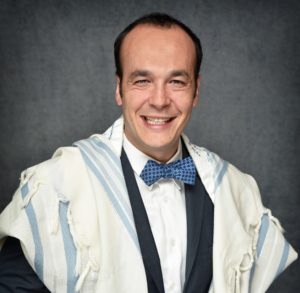D’varTorah
Rabbi Ben Freed
During the Passover seder, we use one of the rarer names of God: “םוקמה” Ha’makom.
This name of God literally means “the place,” and its two best-known uses are in seder and at Shiva minyans when we offer consolations in the name of םוקמה, Ha’makom, in the name of God, in the name of the place.
Even in a day and age of secularization, Passover – and especially the seder – is one of the most celebrated Jewish holidays every year. Its themes of liberation and freedom from bondage are timeless. Even more than that, it’s a holiday about gathering as family and friends to celebrate our people’s continuing story. It is one of our most tangible Jewish holidays, with food, wine and searches around the house built into the celebration. It’s a holiday that is especially hard when we’ve lost a loved one, such as when a child leaves the nest for college or career opportunities. Any time that coming together in one place, one makom, is difficult, challenging or impossible, we feel the absence on a deeper level.
For the last two years, more of us than usual have held seders in a different makom, a different place than we were used to or with many empty m’komot, empty places, around the table. This year, God willing, many of us again will gather in different places to fill our m’komot, our places, with noshing, shmoozing, laughter and song.
For Ariane and me, taking necessary precautions for our family meant that we spent a lot more time at home than usual. Being restricted to my makom allowed me to recognize many aspects of the homes Ariane and I shared over the past two years that I may not have fully appreciated before: the way the natural light hits the walls in the morning and the evening; the balcony in New York where we ate, celebrated essential workers, and even had a couple of dance parties; our new home in Louisville that we have worked hard to furnish and decorate; my partner who I shared the space with; and myriad other little things about our makom. Perhaps this can give us a new understanding of why this word makom, is also a name for God.
I believe God is all around us and takes many different forms, but we do not always take the time to stay in one place – or one moment – long enough to recognize God’s presence within it. On Passover, God is asking us to sit in one place for a few hours with our family and close friends (this year, hopefully, without the distractions of technology and the outside world) and to appreciate the makom: the physical place in which we find ourselves, the wonderful people with whom we are celebrating, and HaMakom, The Ultimate Place, the Divine.
I encourage you this year during your seder to take a moment to pause when you come to the prayer Baruch Ha’Makom, Blessed is God/The Place – it comes towards the beginning of the Maggid section, just after the Four Children.
Look around and appreciate the makom, the place, where you are now. Go around your seder table and let everyone share something they are feeling about the space you are in. For some, this might feel celebratory; for others, this could be a difficult reminder of those whose m’komot that remain empty. Perhaps, for some, it could even be a recognition of the holiness of your place and your gathering, with an increased appreciation for the presence of the Divine, whose spirit enlivens our places and our festivities.
Wishing everyone a Chag Kasher V’Sameach, a happy and meaningful Passover.
(Rabbi Ben Freed is the spiritual leader of Keneseth Israel.)



